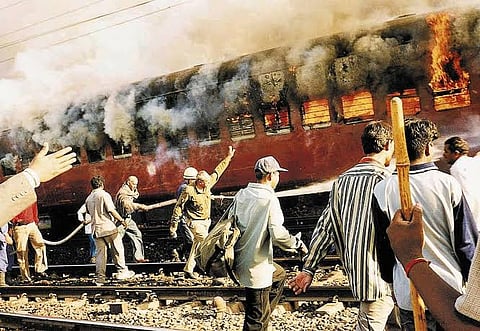'Godhra tragedy could have been prevented', Gujarat HC upholds dismissal of 9 railway constables
The Gujarat High Court has upheld the dismissal of nine railway police constables who were supposed to be deployed on the Sabarmati Express on the day of the 2002 Godhra train burning incident. The court remarked that had the personnel travelled on their designated train instead of choosing an alternate one, the tragic event might have been averted. In a detailed 110-page ruling issued on April 24, Justice Vaibhavi D Nanavati observed that the officers falsified entries in the railway records and exhibited gross negligence in performing their duties. The constables, instead of returning on the Sabarmati Express as per their assignment, took the Shanti Express, despite the former being only six hours delayed. "It is undisputed that the petitioners were assigned to return by the Sabarmati Express. Yet, despite recording this in official logs, they boarded the Shanti Express instead," the court noted. "Had they traveled as assigned, the unfortunate events at Godhra could potentially have been avoided." According to the court, disciplinary proceedings against the constables were thorough and procedurally sound. The authorities had not only removed them from service but had also followed up with appeals and reviews that consistently upheld the penalty.
The court emphasized that the Sabarmati Express was categorized as an ‘A’ class train—where the risk of incidents such as chain-snatching or violent altercations was higher. As per protocol, such trains required a minimum deployment of three armed police personnel, along with others equipped with sticks and ropes, and plainclothes officers for internal surveillance. The petitioners, aware of this requirement, still opted to travel separately and casually disregarded the assignment. Significantly, the S-6 coach of the Sabarmati Express—where the fire broke out—had no police presence at the time of the incident. The absence of security, despite the officers being assigned to the train, was seen as a serious dereliction of duty. The High Court also rejected arguments made by the petitioners regarding bias in the departmental inquiry. It noted that allegations against the inquiry officer were raised only after the conclusion of the proceedings, and no objections were recorded at the time of appointment or during the inquiry itself. The judges found no material evidence to support claims of bias.
In addressing the petitioners' claim that they had no prior knowledge of the attack or any reason to travel on Sabarmati, the court pointed out inconsistencies in their official logs. They had falsely recorded that they were traveling on the Sabarmati Express, yet boarded the Shanti Express without informing superiors or correcting the record. “Their failure to perform their assigned duties, coupled with falsified entries, warrants the punishment imposed. The officers were expected to act responsibly, especially while holding positions in the police force,” the court observed, referencing Article 311(2) of the Indian Constitution which ensures procedural fairness in disciplinary action. The nine dismissed constables—Gulabsinh Zala, Khumansinh Rathod, Nathabhai Dabhi, Vinodbhai Bijalbhai, Jabirhussain Sheikh, Rasikbhai Parmar, Koshorbhai Parmar, Kishorbhai Patni, and Punabhai Bariya—had been assigned to patrol duty between Ahmedabad and Dahod. After completing their forward journey on the Rajkot-Bhopal Express, they were scheduled to return via the Sabarmati Express. Despite this, they left Dahod on the Shanti Express at 5:21 AM on February 27, 2002, and recorded the train’s arrival in Ahmedabad at 10:05 AM as "safe"—without ever explaining the switch.
The Sabarmati Express reached Godhra at 7:35 AM that day. What followed was a horrific incident where a coach was attacked and set ablaze, leading to the death of 58 individuals, including women and children. Following the tragedy, the officers were suspended on March 1, 2002. A preliminary inquiry held in April 2002 concluded that they had violated duty by not traveling on the assigned train. A formal departmental inquiry was initiated in January 2003. The inquiry officer, in his report, emphasized that had the police squad been present on board, they could have either prevented the attack or at least minimized the casualties and possibly apprehended some attackers immediately. Subsequently, the Superintendent of Police, Western Railway, issued a show cause notice, and after reviewing the responses, ordered their removal in October 2005. The petitioners’ appeal was dismissed by both the Additional DGP, CID (Railways), and later by the Chief Secretary in 2008, who upheld the disciplinary findings after addressing 13 specific issues raised by the dismissed officers. The High Court concluded that the dismissals were lawful, proportionate, and in accordance with established rules under the Bombay Police (Punishment and Appeal) framework.
.png)


